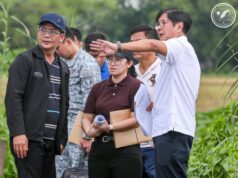Atty. Jackie De Guia, CHR spokesperson, said the meeting gathered all commissioners headed by CHR chair Jose Luis Martin Gascon as well as all 15 regional directors and their senior investigators.
The meeting is not only meant to strengthen the EJKTask Force and obtain updates but also to talk about new approaches to the EJK cases, she said.
The EJK-TF is headed by Commissioner Gwendolyn Pimentel- Gana and will have a new member in regional director Jasmin Navarro-Regino of Region 3, she added.
De Guia said Gana is assisted by Commissioner Leah Tandora- Armamento in the EJK-TF and has for its members the head of the legal division Atty. Flor Adelano and her lawyers and now Regino.
The EJK-TF is less than 10 but with the understanding that the entire regional office structures in the regions are being tapped by the EJK-TF, De Guia said.
“The EJK-TF is mandated to consolidate all data to provide a deeper analysis of all the EJK cases and to ensure that all cases are documented and given a human rights lens,” she explained.
555 cases
De Guia said currently as of August 2, the CHR has 555 cases involving 705 deaths which are pending in the commission.
De Guia said their EJK number is comparatively much lower than the Philippine National Police (PNP) which has “approximately 3,000 cases” based on its public information office while media has pegged it at around “7,000 to 12,000.”
“Our statistics will only show the number of cases we are currently investigating at 555 cases,” she said.
“If you will look at the trends, it will appear that the number of EJK incidents is higher in some urban centers such as the National capital region (NCR), Region 3, Region 4 as well as Cebu,” De Guia said.
“But if you look at the cases we are investigating, you also have to factor in the challenges we are facing as compared to the PNP which has offices in every city or municipality while we only have regional offices and we only have 15 regional offices all over the country,” she lamented.
De Guia also said “each regional office only has seven to 10 investigators and we only have four lawyers for every region but not all regions have lawyers.”
She said in Region 4, the CHR only has one lawyer while in Region 3 the CHR only has two lawyers besides the regional director herself.
“This is the context of the number of cases we are currently investigating plus the fact that these investigators also handle other functions as well like jail visitations because we are also mandated to visit all detention facilities all over the country,” she explained.
De Guia said the CHR also handles other cases involving economic, social and cultural rights. “We also conduct alternative dispute resolutions on a number of cases, so it’s a lot of things that we have to factor in and also we only have one vehicle per region,” she said.
“You can just imagine the sheer difficulty of investigating all of those cases aside from the fact you have additional cases happening everyday adding up to those numbers. That’s how difficult all of these have been for the commission,” she added.
“Our investigators only have minimum Civil Service Commission requirements but with relevant courses to the field of investigation such as psychologists and criminologists and such other fields,” she explained.
Zero budget threat
“We do respect the statement made by Speaker Pantaleon Alvarez, however we reiterate that one of the guarantees that the Constitution has provided is that we will enjoy fiscal autonomy and we are optimistic that congress will recognize this,” she explained.
“To be fair, this (Duterte) administration has in fact given us our highest budget this year of P700 million but next year the one that has been the subject of the budget hearing last Monday, it is pegged at around P600 million plus the reason being is that they have now removed the budget allocation for capital outlay which is understandable,” she explained further.
“There is no budget for capital outlay so we will be unable to purchase additional vehicles but we are optimistic that maybe congress can add to our budget or even the Senate itself as what they did last year,” she added.
“We only have one vehicle per region, you can just imagine if a place of incident happens like five hours away, aside from the hours of travel and the logistics, then it’s really very difficult for us to investigate all of these cases especially with the big volume,” she lamented.
CHR supports anti-drug campaign
The CHR is supportive of the drug campaign of the government and there is no mistake about that because RA 9165 is actually a human rights based law. The declaration of the policy of the state there is for the protection of the youth and therefore we support it, De Guia said.
“Human rights is all about the rule of law so we would like to see the penalties specified in RA 9165 carried out and that is apprehension, imprisonment and imposition of fines,” she said. “If the campaign on drugs can be carried out without necessarily resulting to EJKs unless there is sufficient basis like when they are justified, then that will be actually be better,” she added.
The CHR is an independent office created under the 1987 Constitution of the Philippines with the primary function of investigating all forms of human rights violations involving civil and political rights in the Philippines. The Commission is composed of a Chairperson and four members.



